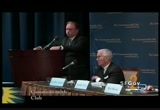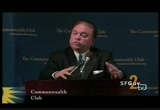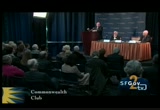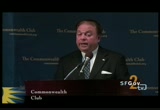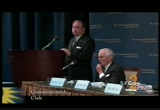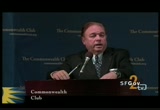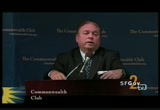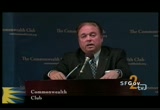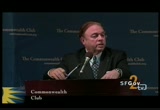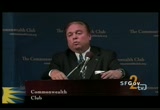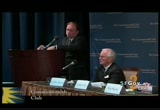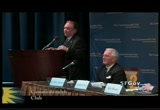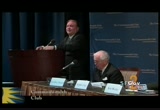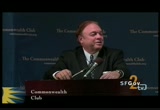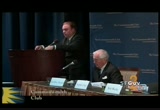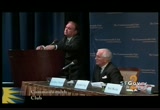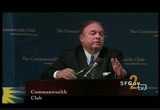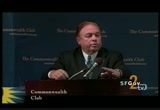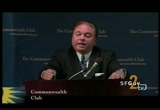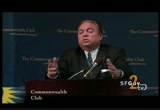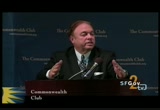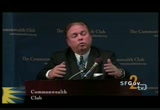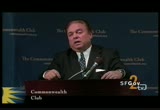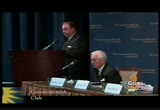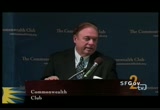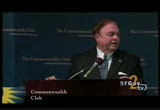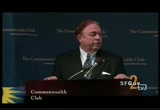tv [untitled] July 25, 2011 1:30pm-2:00pm PDT
1:30 pm
about the role of the jury system, both in civil and in criminal cases. >> well, i strongly believe in the jury system. i am a jury traveler. that is all i have done for 45 years. my personal experiences that i have seen the collective wisdom of a jury actually be one of the most beautiful things you can witness in achieving justice. sometimes, the jury, still following the law, can see through a lot of legal arguments and do what is right, legally right, and that is a beautiful part of the jury system. i have been involved with a magnet part of a celebration, which is going to go into its 800-year anniversary in 2015
1:31 pm
that is the genesis of the jury system. surprisingly, england has virtually no jury system left as part of its justice system. we're the last bastion of the jury system. however, japan just recently decided to inaugurate the jury system. we're working with the japanese, who culturally, historically, are not comfortable with the jury system, because they don't usually have discussions about a different point of view. we actually show the movie "truck -- 12 angry men" to demonstrate how one person can make a huge difference. we show them "to kill a mockingbird." there are lots of things that we do that we try to get them interested in the jury system. it is growing, that interest. i am worried about the jury
1:32 pm
system after some of these recent cases. without opining on those cases, to tell you the truth, i don't want those cases because they will frustrate me. i see things happen there that just should not happen, either lawyers acting certain ways, the judges act in certain ways. i really don't follow it. plus, i don't know what is being kept out from the jury, withheld by judges and so forth. what i do see is jurors being attacked. you see what has happened to some of the jurors in recent cases. we cannot have that occur. what will happen when you go to court and you need a jury trial, and you need jurors, how many people are going to be jurors or wish to be jurors when they think that they're going to be followed around by the press or people trying to get their phone number and harassment?
1:33 pm
we have to protect jurors. i have tried a number of cases that have been very high- publicity cases, and they have still been televised, but you haven't seen the jury's face. i believe in the public telecasting, it is very good to demystify the law in as many ways as possible. it is not some fraternity that operates independently. in florida, the supreme court argument, for example, they are televised on all of them. i wish the united states supreme court would televise its proceedings. i think it would be very helpful to americans to understand the justice system. i am in favor of the public seeing what goes on in courtrooms. i think we need to do more to protect jurors so that they can do their jobs and not worry about what happens after the trial.
1:34 pm
>> if there were some other country that we were advising about their justice system, what would you recommend that they adopt from mars -- ours that they don't have? one might be the jury system. what would you say to them about aspects of our system that they ought to be very skeptical about? >> well, i actually have had that conversation. during this year, i spent most of my time in the united states. i have visited 20 different countries, 30 cities, and spoken to the chief justice of the countries i have visited. that includes the chief justice of the supreme court of russia, where we had a long conversation one-on-one talking about issues like this. i tell you what happens in other countries and what they are
1:35 pm
doing. in russia, for example, you have 200,000 jurors. you don't even have to go to high school. you have no attorney-client privilege. you go to court. they only have 35,000 average cats. -- advocates. they handle the most difficult cases. we were talking about how to professionalize, if you will, the legal profession. the aba was formed 133 years ago only for two purposes. one, to create a code of ethics for all lawyers. the second one is to increase the quality of legal education. that is still our fundamental mission.
1:36 pm
so, one suggestion i made at that time to the chief justice is you have got to give lawyers a monopoly. the only way -- this sounds self-serving, and it is not -- the only way to professionalize it is to have a group of people that have a monopoly so that you can control that group of people, so that they are subject to an ethical code, and so that you can control their licenses and removal of their licenses if they act unprofessionally. of course, monopolies are not something that historic way russia would consider to be an option. they have the issues they're considering over there. china, which i just returned from, they have just announced that they have 200,000 lawyers in china today. the chinese government announced they will have 1 million lawyers in the next 10 years. you might ask yourself, what
1:37 pm
country wants more lawyers? let me tell you one thing about the chinese. they are very smart. an example of how the world has changed is more ipo's were done in shanghai last year than in london and new york combined. all right? it tells you where the world is shifting. why do they need more lawyers? they understand that they want to be the dominant economic and business powerhouse in the world. they look at the american model. they need lawyers to make those deals. i would advise them to have a quality legal education. that is opposed to brazil, where you have 1000 law schools, you can open a law school for a couple hundred bucks, and they have a huge failure rate. we are working with the brazilians, other colleges, law schools. i spoke to their major
1:38 pm
university about these issues, and they are doing what they can to increase. i would tell them to make sure that the legal education is a quality legal education. it is the first of to have a monopoly, so you can control the lawyers, and make sure they are acting in an ethical way. i think there was a third part of the question, what would i tell them not to do. by the way, before i get to that, in vietnam, i recently met with the president of their bar association, similar to the american bar. in most countries, they have a government bar association that is part of the government, in effect. then they just have an non-club federated are. the person was a 70-year-old viet cong that was the chair. one of the most interesting conversations i ever had. someone who did not told
1:39 pm
anyanger, -- not hold any anger, but wanted information and help from america. the american bar association has one of the best legal libraries in the world. coaching and has said -- has built a law school that has no books. we're working with those countries to provide them with legal materials because they have been asking. they also ask for lawyers to help them with their loss students -- loss students -- law students. we have reached out to see if we can do some exchange program. what i tell them not to do, i think that they ought to not -- the same thing i said earlier. they ought to try to find the
1:40 pm
separation of funding issues that the government needs to make it not a political system. they need to look at what is adequate. in these countries, access seems to be the biggest issue. they ask me about access. it is ironic that we have our own access issues, which we talked about earlier, but they are very concerned about not having sufficient access to the legal system for their citizens. >> the problem of under- nourishment, so to speak, of the justice system is one aspect. you have talked about, is it that the trial level, the original access to justice? some one here has written, are there similar problems in the
1:41 pm
slowing of the functions of the appellate courts in resolving legal issues? they mentioned particularly environmental law, which you could say, the same would be true of many other branches of law where the appellate system has become so sluggish, so slow, that often by the time a question finally gets resolved, in an appellate court, particularly the supreme court, the practical utility of the resolution is obsolete, because life has been moving along much faster underneath. is that another dimension of this problem? >> it is certainly a problem. again, quo tote -- to quote winston churchill, it is a terrible system. it is just better than any other one.
1:42 pm
i met with the brazilian supreme court. they have just met with the united states supreme court less than a month ago to deal with their issues. in brazil, every matter that comes before the supreme court of brazil, they had 80,000 cases last year, 80,000, obviously, no justice. you cannot have a system that wants to review 80,000 cases. i do think our appellate system could use some tweaking, but by and large, the florida -- i am not sure i agree with that -- almost certainly respected -- the florida supreme court's motto is, you'll appreciate this, i will not give you the latin version, but the translation is "soon enough, if correct." that is the actual motto.
1:43 pm
sometimes soon enough is not soon enough. you are correct. as you know, professor, the supreme court of the united states takes such few cases that usually the intermediary court decision is the final one. we have to fill the bench. it is going to be worse every day if we have an empty federal bench that cannot function. on the 11th circuit today, we have two vacancies. >> another dimension, it has been called to mind in this question that justice sotomayor was cross-examined in a rather aggressive way concerning her statement that a woman, i think she went on to say hispanic woman --
1:44 pm
>> wise latina. >> you are running way ahead of me. could understand a lot of things much better than people, certainly such as i, and perhaps even you. so we are talking both about, so to speak on ethnic and cultural background and gender. they are affecting the way people understand what justice is. >> well, she -- i thought she answered the question pretty well. she got confirmed. the fact is that at the same time, the justice alito understands some of those cultural issues. it is interesting. the supreme court of the united states today has no protestants
1:45 pm
on the supreme court. isn't that interesting? we basically have catholics and jews. >> i have been very worried about that, i will tell you. [laughter] >> i mentioned it because i thought it was keeping you up at night. the fact is that i have no doubts that they each will do what they said in their nomination, which is they would apply the law, and what justice roberts said is really probably a similar statement. judges are supposed to call balls and strikes. that does not mean that they don't understand -- as a matter of fact, why do you have a diverse jury? the appellate court is just another type of jury, right? the supreme court is a very different kind of jury because the supreme court, and having only had one case before them, i learned very quickly that president -- precedent is not as
1:46 pm
important as the justices, who will decide what the law is. they will change what the lot is if they get a majority of their sisters and brothers to go along with it. to have a jury made up of diverse cultural views and understanding only makes us a stronger society. so i think -- i personally think it is a good thing. i do not think you ever separate your life from what you do. your personal experiences -- some of the personal experiences i talked about tonight shaped my life, and i think they are important parts of the decision- making process in may, that they did not overwhelm -- but they do not overwhelm the legal obligations i have in the case.
1:47 pm
>> i am going to ask a different kind of question, which is -- do you see the difference between the idea of a constitutional democracy, which is a term you have used -- and a constitutional republic? >> i really do not. i use them interchangeably. one of my favorites is ben franklin. when he left the constitutional convention, one of the people on the street and asked him what kind of government he had given them, and he said, "a republic, if you can keep it." i think in many ways, they are one in the same. frankly, there may be some differences that people at some level view it, but i view it as almost interchangeable words. >> speaking of which, the aba has recently given attention to the problem of lobbying.
1:48 pm
in particular, the concern that, speaking of republics, that people will have access to money -- businesses, but others as well -- had higher voices whispering in the year -- can higher voices whispering in the year of congressman or more important, in the year of staff of congressman -- the ear of staff of congressman. do you think that is a serious problem? and what could they do about it? >> if you look at how the supreme court looks at even funding of judicial elections, which are meant to be different than legislative elections -- remember that we have two branches of government that the framers decided would be controlled by a majority vote. that is the executive and
1:49 pm
legislative. they did a pretty good job of keeping their fingers in the air, right? i think that people have a right to lobby. i think for people do not have the same access as rich people. i think for people have a lot of things that they cannot do because of the resources they have available, but i think lobbying in general, as long as it is not anything that is secretive, and that is one of the big problems in lobbying -- the secret of aspects of it -- but as long as they do not violate the law, there is going to be lobbying. i think a bigger problem and one that i'm glad i have a couple of minutes to talk about, is the political action committees coming into states and targeting judges. that is a huge problem. look at what happened in iowa.
1:50 pm
you had a supreme -- you know about the judges that got removed? we do not know about that? ok, let me talk about that for a second year of two supreme court justices were removed by the voters because they voted in a unanimous opinion based on the iowa constitution and the united states constitution on any issue involving gay rights. an anonymous political action committee comes in and takes one sentence out of an opinion of these judges who have been on the bench for years and years and years and defeats them, removes them at the polls and actually suggests that this is -- this was in the words of the organizer -- that this is a wake-up call to the judiciary. actually, it should be a wake-up call to all americans that we
1:51 pm
have a serious problem. we should not allow anonymous pac's to come into states ended the judges based on one sentence is opinion. they are going to have one, let them registered and let them decide -- let the people decide whether or not those judges acted in a way that was consistent with the constitution. as a result of that, one of the things i have asked, and this will be one of the most interesting debates in the next three weeks in toronto, is the judicial recusal coming before congress. i think the republican party versus white, which is the case that said that judges have first amendment rights -- historically, the judicial code said judges are not supposed to comment about how they would rule in a certain case, and they have a very strict code of conduct. republican party versus white, decided by the united states
1:52 pm
supreme court, said that judges have first amendment rights, so they can say anything they want. the point is that if a judge says, "i'm going to rule for or against an abortion issue," without hearing the evidence during the course of the campaign, should that judge be disqualified? by virtue of those statements. and also, if a judge is to be reduced, that is the most difficult thing that a trial lawyer ever has to do. i will tell you as a practicing trial lawyer, you will stay up nights and nights and nights before you will ever see to reduce a judge. it is very serious. >> a few people in the audience might be helped if you would define refusal. >> refusal is when you say to a court, "you cannot be fair." this is the person who is going to judge your case and your client's case. you then write a motion that explains why you think this
1:53 pm
judge cannot be fair. if you do not think that is a tough decision -- it is a tough decision on a lot of bases. your client's affidavits have to be filed. you should never file something like that. it is a very serious document. all documents may be serious, but there's nothing as or more serious than saying to a judge, "you cannot beat their peak at one of the things we are suggesting, for example, and historically, who do you think rules on that? the judge who you are saying cannot be fair. [laughter] ok, this is common sense. something sometimes is lost in the law, as dickens pointed out many years ago. but we are suggesting that somebody other than that judge, another judge, look at that and determine whether it is facially sufficient. because that is the standard.
1:54 pm
we are looking at issues like in florida. you get -- get $500 to a judge, that is okay, but if you give more than that, that judge cannot hear your case. if you are, let's say, the campaign manager for a judge -- because we have elections -- if anybody's interested -- let me just finish that. if you are a campaign manager, he cannot appear before that judge. the aba spent two years on a report called justice in jeopardy, which is online, and it talks about how judges are elected in every single state. one of the document you might be interested in because i understand you have had vigorous talks about this recently is immigration. the aba just issued several months ago the most comprehensive immigration reform report in the last two decades. it contains 10,000 pro bono lawyer hours of some of the best law firms in america. part of the frustration that exists regarding immigration --
1:55 pm
and i was just at a white house meeting monday and tuesday of this week on this issue -- it relates to the anchor -- the anger people have saying that is broken and we cannot fix it and there's nothing we can do. that is wrong. we have an ability to fix the problem. we should fix the problem. the aba rendered a report that it will continue to act as a resource in fixing the problem. these are things they have online if you are interested. suddenly, you could visit our website feared by the way, if we do not get to your question, i will see you out back. happy to talk to you about anything you want to talk about. >> we should all remember that most of us are at least descendants of immigrants. one thing about justice in a
1:56 pm
different sense -- i have a question here that says that some constitutions -- and they mention the cuban one -- include health and literacy as basic rights. should we think of those as basic rights? you will certainly realize that at least as to help, that is one of the key problems going on in the present debt ceiling controversy in washington. >> my favorite book just recently, and i tell you it is $9.95 on amazon, is president kennedy's book called "nation of immigrants." it was written in the early 1960's. it will take you a couple of hours to read it again. it is a fabulous book and makes you realize that nothing has changed in the last 50 years.
1:57 pm
he talks about why we are a nation of immigrants and why that has been the strength of america. so, yes, we are all a nation of immigrants. we should remember that in these debates. but florida has an interesting process, something the all states should adopt, but every 20 years, a group of 30 citizens are awarded by the governor, the speaker of the house, the senate, supreme court, to rewrite florida's constitution, every line of it. it does not go to the legislature. all those pesky lobbyists out there do not get a chance to lobby one way or the other. goes right to the citizens of the state. took us two years to do that. we look at these issues. in florida's constitution, a quality education is now in the florida constitution. i do believe that in america,
1:58 pm
particularly, everyone is entitled to a quality education. and most certainly in this country, people should not go to bed hungry. that is just unacceptable. the way that the misery index in this country is one that is way out of the line because of the recent economic situation. i do not think that we as a country even understand how the unemployment has affected so many families, and we have a whole new strata called the new league for, people who were driving forces yesterday and in bread lines today -- who were driving portias -- driving porsches yesterday and in redlines today.
1:59 pm
we need to make sure americans had the opportunity to have reasonable health care. not excessive. the fact is we've got to make sure that what happened in past -- and we know that. a lot of costs have spiraled out of control. we have to have a baseline. this country has promised that in a sense of being a land of opportunity for all its people. the resources that we have in this country are such that we have to make sure that the least among us are protected. so i hope that one day we will see that happen. >> thank you very much. our thanks to steven zack, president of the american bar association. we also thank our
112 Views
IN COLLECTIONS
SFGTV2: San Francisco Government Television Television Archive
Television Archive  Television Archive News Search Service
Television Archive News Search Service 
Uploaded by TV Archive on

 Live Music Archive
Live Music Archive Librivox Free Audio
Librivox Free Audio Metropolitan Museum
Metropolitan Museum Cleveland Museum of Art
Cleveland Museum of Art Internet Arcade
Internet Arcade Console Living Room
Console Living Room Open Library
Open Library American Libraries
American Libraries TV News
TV News Understanding 9/11
Understanding 9/11